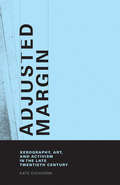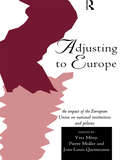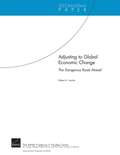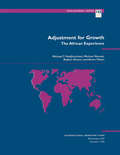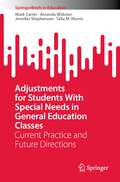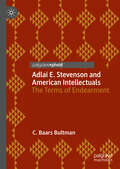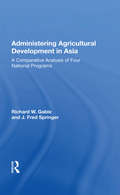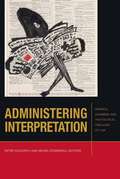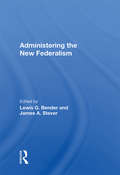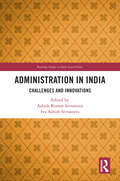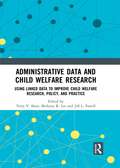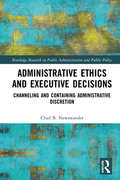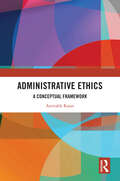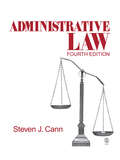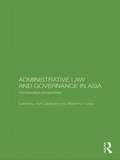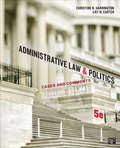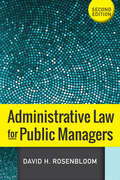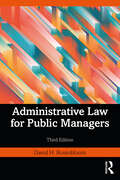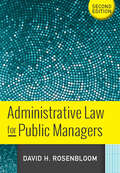- Table View
- List View
Adjudicating Refugee and Asylum Status
by Benjamin N. Lawrance Galya RufferIn this book, an array of legal, biomedical, psychosocial, and social science scholars and practitioners offer the first comparative account of the increasing dependence on expertise in the asylum and refugee status determination process. This volume presents a comprehensive study of the relevance of experts, as mediators of culture, who are called upon to corroborate, substantiate credibility, and serve as translators in the face of confusing legal standards that require proof of new forms and reasons for persecution around the globe. The authors draw upon their interactions with expertise and the immigration process to provide insights into the evidentiary burdens on asylum seekers and the expanding role of expertise in the forms of country-conditions reports, biomedical and psychiatric evaluations, and the emerging field of forensic linguistic analysis in response to emerging forms of persecution, such as gender-based or sexuality-based persecution. This book is essential reading for both scholars interested in the production of knowledge and clinicians considering the role of experts as mediators of asylum claims.
Adjusted Margin: Xerography, Art, and Activism in the Late Twentieth Century
by Kate EichhornHow xerography became a creative medium and political tool, arming artists and activists on the margins with an accessible means of making their messages public. This is the story of how the xerographic copier, or “Xerox machine,” became a creative medium for artists and activists during the last few decades of the twentieth century. Paper jams, mangled pages, and even fires made early versions of this clunky office machine a source of fear, rage, dread, and disappointment. But eventually, xerography democratized print culture by making it convenient and affordable for renegade publishers, zinesters, artists, punks, anarchists, queers, feminists, street activists, and others to publish their work and to get their messages out on the street. The xerographic copier adjusted the lived and imagined margins of society, Eichhorn argues, by supporting artistic and political expression and mobilizing subcultural movements. Eichhorn describes early efforts to use xerography to create art and the occasional scapegoating of urban copy shops and xerographic technologies following political panics, using the post-9/11 raid on a Toronto copy shop as her central example. She examines New York's downtown art and punk scenes of the 1970s to 1990s, arguing that xerography—including photocopied posters, mail art, and zines—changed what cities looked like and how we experienced them. And she looks at how a generation of activists and artists deployed the copy machine in AIDS and queer activism while simultaneously introducing the copy machine's gritty, DIY aesthetics into international art markets.Xerographic copy machines are now defunct. Office copiers are digital, and activists rely on social media more than photocopied posters. And yet, Eichhorn argues, even though we now live in a post-xerographic era, the grassroots aesthetics and political legacy of xerography persists.
Adjusting to Europe: The Impact of the European Union on National Institutions and Policies (Routledge Research in European Public Policy)
by Yves Mény Pierre Muller Jean-Louis QuermonneFirst published in 2002. Routledge is an imprint of Taylor & Francis, an informa company.
Adjusting to Global Economic Change: The Dangerous Road Ahead
by David R. Frelinger James T. Bartis Robert A. LevineThe author combines macroeconomic history since the Great Depression with a brief exposition of economic theory that stems from and explains that history, and explores how that experience may apply to the present economic crisis. He warns that we may again be headed for stagflation and makes suggestions for escaping the worst effects of the crisis.
Adjustment for Growth: The African Experience
by International Monetary FundOccasional Paper from the IMF
Adjustment for Growth: The African Experience
by International Monetary FundFinancial report from the IMF
Adjustments for Students With Special Needs in General Education Classes: Current Practice and Future Directions (SpringerBriefs in Education)
by Jennifer Stephenson Mark Carter Amanda Webster Talia M. MorrisThis book reports a systematic synthesis of research on teachers' use of adjustments to support students with special educational needs who are currently in their mainstream classrooms. It presents a comprehensive analysis and synthesis of both quantitative and qualitative data, including studies involving observation, artefact examination, interviews, and surveys. It offers a holistic understanding of the current practices used by teachers to fulfil the intent of international inclusive education policy, and support the inclusion of students with a range of needs within the context of mainstream classrooms and programmes. This book also offers a range of recommendations for improving practice.
Adlai E. Stevenson and American Intellectuals: The Terms of Endearment
by C. Baars BultmanThis book focuses on a biographical and cultural rendering of Adlai E. Stevenson's alliance with a segment of the intellectual community, with primary attention to the years from 1940 to his death in 1965. At the core of the study is an evaluation of the nature of a relationship that was important both to intellectuals, particularly literary intellectuals, and to Stevenson. This volume exhibits case studies which illumine the alliance through a view of Stevenson's relations with American writers Archibald MacLeish and John Steinbeck.
Administering Agricultur/h: A Comparative Analysis Of Four National Programs
by Richard GableThis comparative empirical analysis of public efforts to improve rice production in Indonesia, the Republic of Korea, the Philippines, and Thailand explores theoretical questions in the field of comparative and development administration and provides detailed information on four major programs designed to alleviate the chronic problems of food prod
Administering Interpretation: Derrida, Agamben, and the Political Theology of Law (Just Ideas)
by Peter Goodrich and Michel RosenfeldPopulism in politics and policy orientations in law have thrown the jurisdiction of the academy and the disciplines of interpretation into disarray. Critique flounders in abstraction and negativity, law loses itself in particularity. Administering Interpretation brings together philosophers, humanists, and jurists from both continental and Anglophone jurisdictions to reassess the status and trajectory of interpretative theory as applied in the art of law. Tracking the thread of philosophical influences upon the community of legal interpretation, the essays move from the translation and wake of Derrida to the work of Agamben, from deconstruction to oikononmia. Sharing roots in the philological excavation of the political theology of modern law, contributors assess the failure of secularism and the continuing theological borrowings of juridical interpretation. The book brings contemporary critique to bear upon the interpretative apparatuses of exclusion, the law of spectacular sovereignty, and the bodies that lie in its wake.Contributors: Giovanna Borradori, Marinos Diamantides, Allen Feldman, Stanley Fish, Pierre Legrand, Bernadette Meyler, Michel Rosenfeld, Bernhard Schlink, Jeanne Schroeder, Laurent de Sutter, Katrin Trüstedt, Marco Wan
Administering The New Federalism
by Lewis G. Bender James A. SteverThis book uses the most comprehensive survey and case research available on the administrative and subnational policy aspects of the New Federalism. It presents readers with both summary and critical analyses of the management responses and adjustments throughout the fifty states in the U.S.
Administration in India: Challenges and Innovations (Routledge Studies in South Asian Politics)
by Ashish Kumar Srivastava Iva Ashish SrivastavaThis book offers a comprehensive analysis of the administration in India from independence to date. It examines the major transformation in the administrative service initiated by the ‘Minimum Government and Maximum Governance’ initiative of the Government of India in 2014. In spite of enormous diversity and population, India has made remarkable progress in various fields such as health, education, infrastructure, and technology. Structured in three parts, (1) social sector, (2) infrastructure and economy, and (3) e-governance and service delivery, the book examines challenges of governance and provides insight into different innovations undertaken to address these challenges. E-governance lies at the core of this transformation of accountability, transparency, and time-bound service delivery. Contributions in this book are written by experts working in the Indian Administrative Service (IAS), academia, and the private sector and cover a wide spectrum of administration from the point of view of different departments of government, as well as the experiences of the authors ranging from senior bureaucrats to mid-career officers and analyses of researchers on administration and its challenges. The initiatives covered in this book can serve as solutions to similar challenges faced by other developing countries in the world. The book will be of interest to researchers in the fields of administration and policy, civil service, public management, South Asian politics, and Development Studies.
Administrative Burden: Policymaking by Other Means
by Pamela Herd Donald P. MoynihanBureaucracy, confusing paperwork, and complex regulations—or what public policy scholars Pamela Herd and Donald Moynihan call administrative burdens—often introduce delay and frustration into our experiences with government agencies. Administrative burdens diminish the effectiveness of public programs and can even block individuals from fundamental rights like voting. In AdministrativeBurden, Herd and Moynihan document that the administrative burdens citizens regularly encounter in their interactions with the state are not simply unintended byproducts of governance, but the result of deliberate policy choices. Because burdens affect people’s perceptions of government and often perpetuate long-standing inequalities, understanding why administrative burdens exist and how they can be reduced is essential for maintaining a healthy public sector. Through in-depth case studies of federal programs and controversial legislation, the authors show that administrative burdens are the nuts-and-bolts of policy design. Regarding controversial issues such as voter enfranchisement or abortion rights, lawmakers often use administrative burdens to limit access to rights or services they oppose. For instance, legislators have implemented administrative burdens such as complicated registration requirements and strict voter-identification laws to suppress turnout of African American voters. Similarly, the right to an abortion is legally protected, but many states require women seeking abortions to comply with burdens such as mandatory waiting periods, ultrasounds, and scripted counseling. As Herd and Moynihan demonstrate, administrative burdens often disproportionately affect the disadvantaged who lack the resources to deal with the financial and psychological costs of navigating these obstacles. However, policymakers have sometimes reduced administrative burdens or shifted them away from citizens and onto the government. One example is Social Security, which early administrators of the program implemented in the 1930s with the goal of minimizing burdens for beneficiaries. As a result, the take-up rate is about 100 percent because the Social Security Administration keeps track of peoples’ earnings for them, automatically calculates benefits and eligibility, and simply requires an easy online enrollment or visiting one of 1,200 field offices. Making more programs and public services operate this efficiently, the authors argue, requires adoption of a nonpartisan, evidence-based metric for determining when and how to institute administrative burdens, with a bias toward reducing them. By ensuring that the public’s interaction with government is no more onerous than it need be, policymakers and administrators can reduce inequality, boost civic engagement, and build an efficient state that works for all citizens.
Administrative Data and Child Welfare Research: Using Linked Data to Improve Child Welfare Research, Policy, and Practice
by Terry V. Shaw, Bethany R. Lee and Jill L. FarrellEvery day, social service agencies collect millions of pieces of data about the children and families they serve. Agencies depend on this data to inform decision-making by personnel throughout the organization and to provide meaningful research and evaluation on program effectiveness and outcomes. As capacity for collecting and utilizing data has increased so has the recognition that this data can and should be used more broadly. Further, it should include not just single-system data, but data across different human service agencies. Administrative/big data systems can be powerful tools in increasing the efficiency and effectiveness of public child welfare services. Understanding, harnessing, and using big data holds tremendous promise in creating transformative change in the social services. Data analytics and data mining can lead to a better understanding of what services work for specific populations (targeting and predictive modelling), provide a more nuanced understanding of service outcomes for the workforce and major stakeholders (transparency), and facilitate collaboration across existing service delivery silos to reduce duplication of services and enhance consumer access to services (efficiency). This book was originally published as a special issue of the Journal of Public Child Welfare.
Administrative Ethics and Executive Decisions: Channeling and Containing Administrative Discretion (Routledge Research in Public Administration and Public Policy)
by Chad B. NewswanderAs first responders to public problems, administrators must survey situations, identify solutions, and occasionally make executive decisions that are binding upon the government as a whole. The ability for administrators to assert claims that orient the government in a particular direction is not only powerful, but it can also be problematic and even dangerous. For administrators, the tension between moving in a spirited way, and remaining sensible, is a problem of how to exercise one’s discretion, especially in the U.S. context, which demands that both be considered and actualized. In dealing with these competing expectations, Chad B. Newswander analyzes how administrators can incorporate executive, legislative, and judicial tendencies to help them handle the problem of discretion. Expanding the thinking of the constitutional school of public administration thought, Administrative Ethics and Executive Decisions is a theoretically grounded and empirically rich study of how administrators incorporate a constitutional ethos to handle the problem of discretion.
Administrative Ethics: A Conceptual Framework
by Amitabh RajanThis insightful book explores the use and application of ethics in contemporary governance and suggests necessary reforms. Following an interdisciplinary approach involving the fields of political science, law, economics, sociology, management, and philosophy, this book analyses their applicability and usefulness in everyday practices in governance, covering its five cardinal virtues—prudence, transparency, discourse, justice, and accountability. Highlighting ethical challenges in aspects of status recognition, oppression, empowerment, social care, public financing, environment protection and others in today’s interconnected world, it delves into the dynamics of administrative power in democracies and showcases how the misuse of power can be controlled through a discourse of ethics in law and governance. The book will be useful to the students, researchers and teachers of public administration, philosophy, political Science, corporate ethics, and governance other related social sciences disciplines. The book will also be an indispensable companion to social activists, advocacy groups, journalists and civil society institutions and public service training institutions.
Administrative Law
by Dr Steven J. CannIn this new edition, author Steven J. Cann once again enlivens the topic of United States administrative law through the use of recent and "classic" legal cases to make it accessible and interesting to students. Administrative Law, Fourth Edition is an engaging casebook that presents a unique problem-solving framework that contrasts democracy with the administrative state. This novel approach places the often complex subject matter of U.S. administrative law into a more comprehensible context. The Fourth Edition has been completely updated and revised and includes many new cases to reflect changes in the law since the year 2000.
Administrative Law For Public Managers
by David H RosenbloomThis book focuses on the essentials that public managers should know about administrative law-why we have administrative law, the constitutional constraints on public administration, and administrative law's frameworks for rulemaking, adjudication, enforcement, transparency, and judicial and legislative review. Rosenbloom views administrative law from the perspectives of administrative practice, rather than lawyering with an emphasis on how various administrative law provisions promote their underlying goal of improving the fit between public administration and U.S. democratic-constitutionalism. Organized around federal administrative law, the book explains the essentials of administrative law clearly and accurately, in non-technical terms, and with sufficient depth to provide readers with a sophisticated, lasting understanding of the subject matter.
Administrative Law and Governance in Asia: Comparative Perspectives (Routledge Law in Asia)
by Tom Ginsburg Albert H. Y. ChenThis book examines administrative law in Asia, exploring the profound changes in the legal regimes of many Asian states that have taken place in recent years. Political democratization in some countries, economic change more broadly and the forces of globalization have put pressure on the developmental state model, wherein bureaucrats governed in a kind of managed capitalism and public-private partnerships were central. In their stead, a more market-oriented regulatory state model seems to be emerging in many jurisdictions, with emphases on transparency, publicity, and constrained discretion. This book analyses the causes and consequences of this shift from a socio-legal perspective, showing clearly how decisions about the scope of administrative law and judicial review have an important effect on the shape and style of government regulation. Taking a comparative approach, individual chapters trace the key developments in the legal regimes of major states across Asia, including China, Japan, Korea, Malaysia, Taiwan, Hong Kong, Indonesia, Singapore, the Philippines, Thailand and Vietnam. They demonstrate that, in many cases, Asian states have shifted away from traditional systems in which judges were limited in terms of their influence over social and economic policy, towards regulatory models of the state involving a greater role for judges and law-like processes. The book also considers whether judiciaries are capable of performing the tasks they are being given, and assesses the profound consequences the judicialization of governance is starting to have on state policy-making in Asia.
Administrative Law and Politics: Cases and Comments
by Lief H. Carter Christine B. HarringtonAuthors Christine B. Harrington and Leif H. Carter know that while bureaucratic government is no cure for the shortcomings of free enterprise, government oversight and regulation is crucial to keeping power within democratic boundaries. This Fifth Edition of Administrative Law and Politics shows the scope and power of administrative government and demonstrates how the legal system shapes administrative procedure and practice. Using accessible language and examples, the casebook provides the foundation that students, public administrators and policy analysts need to interpret the rules and regulations that support our legal system. Offering a balance of case excerpts and commentary, this new edition and has been thoroughly updated to account for recent developments, such as administrative law vis-à-vis freedom of information statutes, including the NSA’s surveillance program; how administrators and judges navigate the philosophical, political, and economic stakes behind divisions in the Roberts Court’s judicial theory of statutes; non-enforcement and government inaction, including the position of Administrative Law Judges (ALJ) and the federal government’s (Department of Education) Title IX policy on sexual assault, harassment, and other forms of sexual misconduct in education.
Administrative Law and Politics: Cases and Comments
by Lief H. Carter Christine B. HarringtonAuthors Christine B. Harrington and Leif H. Carter know that while bureaucratic government is no cure for the shortcomings of free enterprise, government oversight and regulation is crucial to keeping power within democratic boundaries. This Fifth Edition of Administrative Law and Politics shows the scope and power of administrative government and demonstrates how the legal system shapes administrative procedure and practice. Using accessible language and examples, the casebook provides the foundation that students, public administrators and policy analysts need to interpret the rules and regulations that support our legal system. Offering a balance of case excerpts and commentary, this new edition and has been thoroughly updated to account for recent developments, such as administrative law vis-à-vis freedom of information statutes, including the NSA’s surveillance program; how administrators and judges navigate the philosophical, political, and economic stakes behind divisions in the Roberts Court’s judicial theory of statutes; non-enforcement and government inaction, including the position of Administrative Law Judges (ALJ) and the federal government’s (Department of Education) Title IX policy on sexual assault, harassment, and other forms of sexual misconduct in education.
Administrative Law for Public Managers
by David H. RosenbloomAdministrative Law for Public Managers a comprehensive guide to the essentials that public managers need to know about administrative law#151;why we have administrative law, the constitutional constraints on public administration, and administrative law’s frameworks for rulemaking, adjudication, enforcement, transparency, and judicial and legislative review. Rosenbloom views administrative law from the perspectives of administrative practice, emphasizing how various administrative law provisions promote their underlying goal of improving the fit between public administration and U. S. democratic-constitutionalism. The second edition has been thoroughly revised to include more on state administrative law, as well as an expanded discussion of procedural due process. It has also been updated to include the major statutes, court cases, executive orders and other major executive initiatives since 2003. The addition of discussion questions makes this an even more valuable resource for public administration classrooms and students. Organized around federal administrative law, Administrative Law for Public Managers explains the fundamentals of administrative law clearly and accurately, in non-technical terms, and with sufficient depth to provide readers with a sophisticated, lasting understanding of the subject matter.
Administrative Law for Public Managers
by David H. RosenbloomThis book focuses on the essentials that public administration students and public managers should know about administrative law—why we have administrative law, the constitutional structure for and constraints on public administration, and administrative law’s formats for rulemaking, adjudication, enforcement, transparency, and judicial and legislative review of administrative activity. Author David Rosenbloom views administrative law from the perspectives of administrative practice, rather than lawyering, with an emphasis on how various administrative law provisions promote their underlying goals of improving the fit between public administration and US democratic-constitutionalism. Organized around federal administrative law while including material on state practices where appropriate, the book explains the essentials of administrative law clearly and accurately, in non-technical terms, and in sufficient depth to provide readers with a sophisticated, lasting understanding of the subject matter. This thoroughly revised third edition includes: Separate chapters on the constitutional frameworks for administrative authority and individual constitutional rights in the contemporary administrative state Inclusion of newer court decisions and examples throughout the text Treatment of Donald J. Trump’s presidency and President Joseph R. Biden Jr.’s first year in office Greater attention to guidance documents, administrative "dark matter," and the Congressional Review Act Thorough updating and refreshing of the text, suggested additional readings, and chapter discussion questions. Written in a reader-friendly style, Administrative Law for Public Managers, 3rd Edition is an ideal introduction to the subject for students in public administration, public policy, American government, law and practicing public managers alike.
Administrative Law for Public Managers (Essentials Of Public Policy And Administration Ser.)
by David H RosenbloomThis book focuses on the essentials that public managers should know about administrative law—why we have administrative law, the constitutional constraints on public administration, and administrative law’s frameworks for rulemaking, adjudication, enforcement, transparency, and judicial and legislative review. Rosenbloom views administrative law from the perspectives of administrative practice, rather than lawyering with an emphasis on how various administrative law provisions promote their underlying goal of improving the fit between public administration and U.S. democratic-constitutionalism. Organized around federal administrative law, the book explains the essentials of administrative law clearly and accurately, in non-technical terms, and with sufficient depth to provide readers with a sophisticated, lasting understanding of the subject matter.
Administrative Law for Public Managers 2nd Edition
by David H. RosenbloomAdministrative Law for Public Managers a comprehensive guide to the essentials that public managers need to know about administrative law--why we have administrative law, the constitutional constraints on public administration, and administrative law’s frameworks for rulemaking, adjudication, enforcement, transparency, and judicial and legislative review. Rosenbloom views administrative law from the perspectives of administrative practice, emphasizing how various administrative law provisions promote their underlying goal of improving the fit between public administration and U. S. democratic-constitutionalism. The second edition has been thoroughly revised to include more on state administrative law, as well as an expanded discussion of procedural due process. It has also been updated to include the major statutes, court cases, executive orders and other major executive initiatives since 2003. The addition of discussion questions makes this an even more valuable resource for public administration classrooms and students. Organized around federal administrative law, Administrative Law for Public Managers explains the fundamentals of administrative law clearly and accurately, in non-technical terms, and with sufficient depth to provide readers with a sophisticated, lasting understanding of the subject matter.

